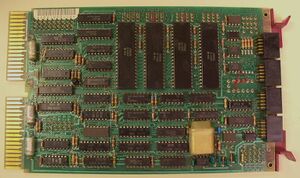DLV11-J asynchronous serial line interface
The DLV11-J asynchronous serial line interface card was a QBUS peripheral for the PDP-11 series of computers which provided four asynchronous serial lines on a single dual-width card, the M8043.
It provided both EIA RS-232 or RS-422 connectivity at speeds of 150 to 38.4K baud; receive and transmit speeds are the same on each line, but each line could be set independently. It did not have any modem control. 20mA operation was possible with the DLV11-KA 20mA Current Loop Option.
Line connection was via four separate 10-pin Berg connector headers on the top edge of the card, using the standard DEC asynchronous serial line pinout.
Configuration was via wire-wrap jumpers.
Programing interface
Like the ancestral KL11, for each line the DL11-J has 2 device registers for the receive side (one Control and Status Register - CSR - and one data buffer register), and similarly, two for the transmit side. Each line has two interrupt vectors - again, one receive, and one transmit. The DLV11-J is program compatible with other KL11-type interfaces.
Normally both the registers and interrupt vectors are in contiguous blocks for the 4 lines, but there are special provisions for one line to be configured as the PDP-11 main console (which is always a KL11/DL11 compatible device). The standard there is that 0777560 is the base address (so the receiver registers are 0777560-2, and the transmitter are 0777564-6), and 060 is the base vector.
That line can be set to halt the CPU, or re-boot the system, when a 'break' is seen. All lines can send a 'break'.
The first line after the console is always assigned the address 0776500, and vector 0300. Additional lines are assigned addresses and vectors immediately following, for DL11's #1-#16 (i.e. 0776500-676 and 0300-0476).
Cabling
There are several options for cabling to the DLV11-J. One is to run individual cables, such as the BC20N-xx (Berg 10-pin connector, to female DB-25S wired as a DCE - i.e. including a null modem) to each line's Berg connector. The alternative approach is that DEC produced a number of distribution panels which can be used with the DLV11-J; all have a flat cable which splits into four sub-cables, each with a Berg 10-pin connector which plugs into one of the Berg headers on the DLV11-J.
One is the D315; it has four male DB-25P connectors, i.e. wired as a DTE. It comes in two variants: in both, the flat cable is soldered directly to a PCB: in one, that contains the final DB-25P connectors; in the other, they are mounted in a subsidiary plate, and each one has a built-in static filter.
Another 4-port distribution panel has a Berg 40-pin header; a flat cable with 4 Berg 10-pin connectors plugs into that. It can be identified by the DEC part number on the PCB it uses; 50-15220-01 (the part number for the complete assembly is 54-15221). It is possible that the similar 70-19964-01 (used with the DZV11), would also work (its PCB part number is 50-15419; the part number for the complete assembly is 54-15420).
See also
- DLV11 asynchronous serial line interface
- DLV11-E asynchronous serial line interface
- DLV11-F asynchronous serial line interface
Further reading
- DLV11-J Cabling, MicroNote #056
- Maximum Configuration of DLV11-J Modules, MicroNote #060
- DLV11-J Receiver Chip Problem, MicroNote #067A
External links
- DLV11-J user's manual (EK-DLV1J-UG-001)
- DLV11-J Field Maintenance Print Set (MP00586)
- CKDLVJ1 Field Maintenance Print Set (MP00990-01) - distribution panel cabinet kit
